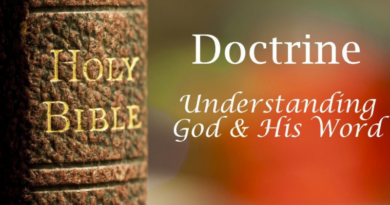BIBLE DOCTRINE 22: HELL
God’s Word teaches:
That Hell fire is a place of everlasting punishment where sinners (all who do not have their names in the book of life) will suffer torments for ever and ever. It was prepared for the devil and his angels (Matthew 25:41) but God has decreed that the wicked and those who forget Him and reject Christ will also be cast there because of their sin and neglect of His
salvation – Psalm 9:17; Matthew 25:46; Luke 12:4,5; 16:19-31; Matthew 5:22,30; Mark 9:43-47; Revelation 14:10,11; 20:10,12,15.
The fact and reality of Hell is an important and recurring theme in the Scriptures. It is vividly captured as a place of agonizing torment and everlasting punishment in unquenchable fire for the unconverted (Matthew 25:41; Mark 9:43-48; Luke 16:23,28). Owing to its frightful credentials, there are those who merely explain away hell as a biblical truth. Many have even drawn up the broken cisterns of erroneous assertion to rationalize their gross inadequacies. The Bible, however, unambiguously provides ample illuminations of hell, as the indisputable abode of sinners (Psalm 9:17; Proverbs 9:13-18; Mark 9:43-48; Luke 16:22-28; Revelation 20:13-15; 21;8).
Hell is a fearsome ‘rest place’ for transgressors. And the Lord Jesus Christ spent considerable time lending weight to this reality. He told the city of Capernaum, for instance, that it would be turned into hell because of its iniquities (Matthew 11:23). He warned repeatedly on the danger of hell and the need for His listeners to steer clear of it (Matthew 5:22,29,30; 10:28; 18:8,9; Mark 9:43-48; Luke 12:5). He offered vivid explanations on hell as a place of everlasting punishment (Matthew 25:41,46; Mark 9:43- 48; Luke 16:22-28; Revelation 14:10,11). He revealed that sinners who die unsaved would have their
lot in hell (Matthew 7:15-19; 13:40-42,50; 23:33; 25:41-46; Luke 16:23; Revelation 19:20; 20:14,15; 21:8).
The Apostle also followed the same thematic explanations of hell as offered by the Lord (Romans 2:5-9; 2 Thessalonians 1:8,9; Hebrews 10:26,27; James 3:5,6; 2 Peter 2:4,9; 3:7; Jude 7,23; Matthew 3:7- 10). The church today cannot afford to assume a less specific position on the teaching of hell, without subverting the sacredness and completeness of Scriptures. The word ‘Hell’ is found about fifty-four times in the King James Version of the Bible. Its translation in Hebrew, ‘ Sheol ’, occur thirty-one times, while the Greek interpretations ‘ Gehena ’ and ‘ Tartarus ’ occur twelve times and once respectively. Its regular usage in Scriptures, apart from the allusions drawn to it by the Lord and other bible characters, lend sufficient validity to its reality.
When a sinner dies, his soul immediately proceeds to hell where, with full consciousness, he tastes the excruciating pain that hell offers. The story of poor Lazarus and the rich man best exemplifies the eternal punishment awaiting the sinner (Luke 16:23,24).
Hell is also a place where the memory of the damned comes alive. The rich man in Luke 16:23,24 remembered his riotous living while on earth as well as five other brothers yet unsaved. Apart from the acute discomfort of hell, the regret of an error of judgment while on earth on the part of the unsaved, presents an everlasting torment of its own.
The teaching of the doctrine of hell must scrupulously avoid erroneous and unscriptural views of false teachers. The concept of purgatory, representing a so-called intermediate state between death and appearance before God has no biblical foundation. Neither is the notion of the annihilation of the wicked correct. The future punishment of the wicked is eternal while the sinner at death automatically receives an express translation into hell “Where their worm dieth not, and the fire is not quenched” (Mark 9:44- 48; Deuteronomy 32:22; Job 26:6; Isaiah 5:14; Amos 9:2; 2 Peter 2:4; 2 Thessalonians 1:7-9). The needless controversy over the reality of hell is not strange as the Scriptures clearly allude to this: “But the natural man receiveth not the things of the Spirit of God: for they are foolishness unto him: neither can he know them, because they are spiritually discerned” (1 Corinthians 2:14). Since God is holy, sin must be punished in the person of the sinner or in the person of the sinner’s substitute, The Lord Jesus Christ.
No man believes in Hell because he simply wants to. He believes in Hell because he is compelled to. It is true that eternal punishment is not a pleasant subject for discussion, yet it is a fearful reality, an awful and tragic fate.
1. Admit that you are a sinner. "For all [humans] have sinned, and comes short of the glory of God....[and] the wages of sin is death; but the gift of God is eternal life through Jesus Christ our Lord" (Romans 3:23)
2. Repent now. "Repent ye therefore, and be converted, that your sins may be blotted out ...[for] if we confess our sins, he is faithful and just to forgive us our sins, and to cleanse us from all unrighteousness " (Acts 3:19, 1 John 1:9)
3. Believe that God loves you and Jesus died for you. "God commendeth his love toward us, in that, while we were yet Sinners, Christ died for us" (Romans 5:8)
4. Invite Jesus into your life through prayer of faith. Jesus says, "Behold, I stand at the door, and knock: if any man hear my voice, and open the door, I will come in to him, and will sup with him, and he with me" (Revelation 3:20)


